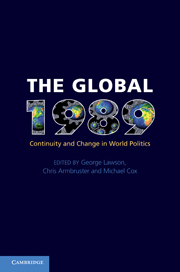Book contents
- Frontmatter
- Contents
- List of figures
- List of tables
- Notes on contributors
- Acknowledgements
- List of abbreviations
- Introduction: the ‘what’, ‘when’ and ‘where’ of the global 1989
- Part I What and when
- Part II Where
- Part III Continuity and change
- 9 One bright moment in an age of war, genocide and terror? On the revolutions of 1989
- 10 A dangerous utopia: the military revolution from the Cold War to the war on terror
- 11 From Berlin to Baghdad: learning the ‘wrong’ lessons from the collapse of communism
- Conclusion: was there a global 1989?
- Bibliography
- Index
11 - From Berlin to Baghdad: learning the ‘wrong’ lessons from the collapse of communism
Published online by Cambridge University Press: 05 June 2012
- Frontmatter
- Contents
- List of figures
- List of tables
- Notes on contributors
- Acknowledgements
- List of abbreviations
- Introduction: the ‘what’, ‘when’ and ‘where’ of the global 1989
- Part I What and when
- Part II Where
- Part III Continuity and change
- 9 One bright moment in an age of war, genocide and terror? On the revolutions of 1989
- 10 A dangerous utopia: the military revolution from the Cold War to the war on terror
- 11 From Berlin to Baghdad: learning the ‘wrong’ lessons from the collapse of communism
- Conclusion: was there a global 1989?
- Bibliography
- Index
Summary
Introduction
Closing in on the second decade of the post-communist era and reflecting back on the revolutionary events of 1989 in Central and Eastern Europe, it is fitting to examine whether and how differing discursive understandings of the fall of communism have subsequently affected domestic and foreign policy outcomes, particularly in the United States. As the sole superpower left standing after the bipolar conflict, US political elites and policy-makers were easily tempted by ‘Cold War triumphalism’ – the claim that the disintegration of the Soviet Empire in Central and Eastern Europe was a decisive victory for the United States (Schrecker 2004: 2). Underneath this dizzying hubris, especially expressed by US neo-conservative hard-liners, existed a set of assumptions and policy prescriptions for the reorganisation of global order that, allied to the momentum gained by the tragedy of 9/11, generated a sweeping vision for democratisation in the Middle East and beyond.
Politicians and foreign policy-makers have long used history to frame options and make decisions. However, history is usually not taken neutrally, but interpreted for what it teaches or portends (May 1973). Thus US leaders actively took part in constructing the post-Second World War internationalist order with a view to the isolationist ‘mistakes’ made after the First World War. In the making of Cold War grand strategy, the ‘lesson’ of Munich loomed large, that is, appeasement was both dangerous and ineffective.
- Type
- Chapter
- Information
- The Global 1989Continuity and Change in World Politics, pp. 243 - 270Publisher: Cambridge University PressPrint publication year: 2010



